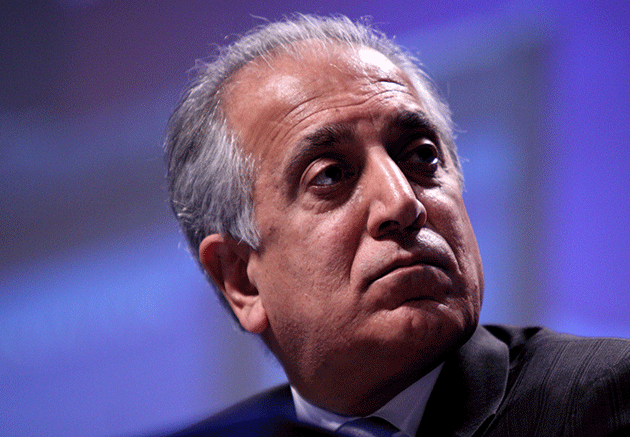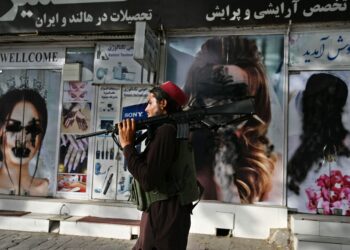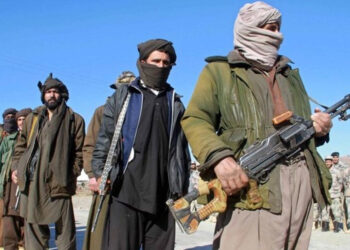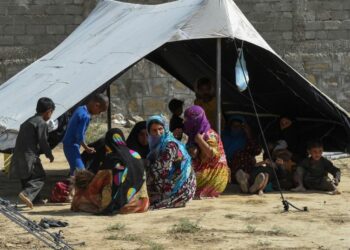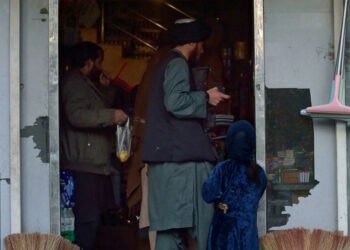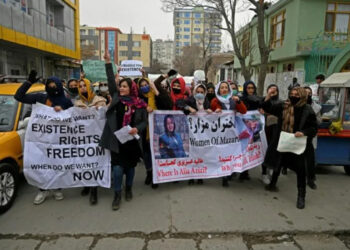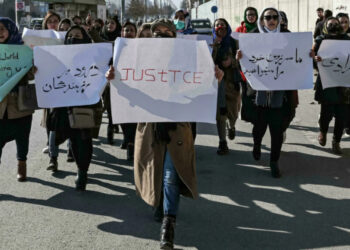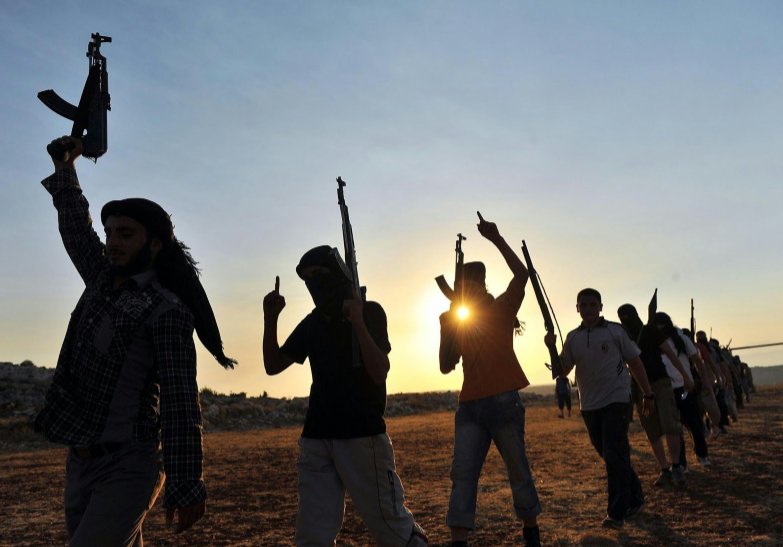The news that former U.S. diplomat Zalmay Khalilzad may come back to Afghanistan as the U.S. special envoy for the country has sparked mixed feelings among political circles.
Ashraf Ghani and friends are excited for their Afghan-American ethno-politician to help them maneuver around the current political deadlock and save their “Afghan” patron-client ethno-cronyism governance, while others are in dismay.
Khalilzad, now 67, supported his fellow tribesman – Ashraf Ghani – to capture the presidency in 2014. Since then, Ghani has put into practice a shambolic tribal-monocracy by delegating presidential powers to a few cronies, known as sector-based “advisers.” They are three or four “trusted” individuals with the same ethnic origins and ethnonationalism beliefs to consolidate power and to contain the powers of others, including Afghanistan’s “First Vice President,” General Dostum.
Thus, the “Afghan” intelligence and security resources are channeled to put legitimate socio-political forces under surveillance while leaving the illegitimate warlords (the Taliban) unchecked to invade cities and massacre soldiers and defenseless civilians.
Such paradoxical governance, along with Ghani’s highly secretive peace politicking with the Taliban, has united almost the entire opposition under the recently announced National Grand Coalition of Afghanistan (GNCA).
Perhaps, the GNCA is bringing Khalilzad back. Even if Ghani reaches a peace “deal” with the Taliban in concealment, it would most likely bring more war than peace. It would bring Ghani and the Taliban against the main leaders of GNCA, who defeated the Taliban with the support of the U.S. in 2001.
Khalilzad sees that in the eyes of the general public and the international representations in Afghanistan, the GNCA’s mix of multi-ethnic personalities with strong social-bases has more legitimacy than Ghani’s tribal-monocracy. Hence, it would be a tough job for Ghani to remain in power through another 2014-like fraudulent election and a subsequent political deal that would be reached in April 2019.
Therefore, Afghanistan is at a critical juncture. The next few months are crucial for its future transformation, given the uncertainty of the upcoming “elections” and the “peace” politicking with the Taliban. All while the GNCA is flexing its muscles and waiting in the wings. At this stage, Khalilzad’s possible arrival would have different implications depending on his tripolar character transformations as the Ugly, the Bad and the Good.
The Ugly Rise in the “Corporate State”
Khalilzad’s rise in the hierarchy of U.S.-Afghanistan relations has been rather ugly. With a Ph.D. and a dignified professorship position at Columbia University, he favored a one-year fellowship at the U.S. Department of States through the Council on Foreign Relations, a “peak association” think tank. That short-term assignment ended his prospect of a globally admirable “Afghan” academician and turned him into an agent of “corporate state.”
Khalilzad could have become Edward Said of Afghanistan to establish a much-needed nontribal intelligentsia for his country of birth in the West that would challenge false narratives and offer holistic Afghanistan-focused “research and analysis” for all stakeholders.
Instead, he got involved in Afghanistan’s violent ethnopolitics with ignominious tasks of advising the U.S. administrations on which armed faction they should support, and vice-versa, as part of a larger interest group.
Evidently, when Khalilzad entered the U.S. foreign policy domain, discriminatory American policies emerged toward the “Afghan” Mujahidin leaders. Jalaluddin Haqqani became a CIA darling with the nickname of “goodness personified,” who did not only receive support but also the prestige of visiting “the White House when Ronald Reagan was president” in the 1980s.
During the next decade, Khalilzad reemerged as the Unocal negotiator with the Taliban over a pipeline project. Subsequently, the “Taliban officials” appeared in the United States.
According to Flaherty et al., “In a late 1997 public relations move, Unocal flew Taliban officials to tour the company’s U.S. offices. They took a side trip to the beach, then flew to Washington for meetings in the Capitol and at the State Department to press their case for U.S. recognition.”
Consequently, the Americans paid for such ugly politicking with the al-Qaeda attacks of September 11, 2001, that humanity will never forget. When the U.S. called on the Taliban and Haqqani to hand over the perpetrator, Osama Bin Laden, they refused and turned against the Americans. Since 2001, the Taliban and their “Haqqani Network” have been the deadliest terrorists fighting the U.S.-led international forces in Afghanistan.
The Bad Who Revived Afghanistan’s Old Tribal System
By the 1990s, Khalilzad had a visible role in the American “military-industrial complex,” as the Director of Strategy, Doctrine, and Force Structure at RAND Corporation, “an organization formed immediately after World War II to connect military planning with research and development decisions.”
Apparently, Khalilzad wanted on-site participation in the “Afghan project,” so he published a paper to put the blame on the late President Burhanuddin Rabbani and the late Defense Minister Ahmad Shah Massoud for not accepting “Commander Haqqani’s peace proposal.” He portrayed these non-Pashtun leaders as the ones with “war monopoly” in Afghanistan and wanted to rival them from a corporatism standpoint.
Therefore, Khalilzad and friends – i.e. Barnett Rubin – wrote a White Paper in 1999 to offer policy options for the United States on Afghanistan. Among other recommendations, he asked for “appointing a high-level special envoy on Afghanistan. The envoy must have sufficient stature and access to ensure that he or she is taken seriously in foreign capitals and by local militias. Equally important, the special envoy must be able to shape Afghanistan policy within U.S. bureaucracies.”
By 2001, Khalilzad turned out to be that American “high-level special envoy” to “shape” everything for Afghanistan and “U.S. bureaucracies” associated to it. Therefore, the mess that Afghanistan is in right now has a lot to do with Khalilzad, who time-traveled the distress Afghanistan decades back to adopt the 1964 tribal constitution in the façade “2001 Bonn Conference on Afghanistan.”
It was imposed as the “nation-state” model that was expunged after decades of war and millions of martyrs in hope of a real constitutionalism, and away from tribal supremacy, on the basis of a “state-nation” replica of Switzerland to ensure equality and equity of all citizens.
Khalilzad did not only revive the old tribal system but also installed his fellow tribesman, Hamid Karzai as the interim president in his bullying capacity as the U.S. “Special Envoy” against the 2001 Bonn Conference delegates’ choice, Satar Sirat, an ethnic Uzbek.
At the 2004 Constitutional Grand Assembly of Afghanistan, Khalilzad was the U.S. Ambassador to Afghanistan, a position believed to be higher in Afghanistan’s patron-client hierarchy of power than the “Afghan” president. In fact, he was the kingmaker then. Hence, he led the Constitution-making process from the “VIP tent.” He coerced and deceived “warlords” to replicate the Bonn System and “craft” it into a “new” Constitution in disguise that undermines democracy in favor of an old tribal-monocracy, in which the unaccountable tribal “client-president” is “more powerful than a king.”
According to Rubin, who had Khalilzad’s blessing to “craft” the 2004 Constitution, “The struggle over the system of government reflected assumptions about how ethnic politics would be expressed in different institutions. Among the institutions of a republican government, everyone assumed that, for the foreseeable future, an elected president would be Pashtun, and, furthermore, a Pashtun approved by the U.S., i.e. Hamid Karzai.”
Hence, the tribal client-president is chosen rather than being “democratically elected,” albeit elections are held to mock democracy. Thus, he acts as the de facto Godfather of the “nation,” or baba, to control the state and the society altogether. Consequently, the tribal-monocracy contaminates the potentials of domestic forces to emerge in the form of independent civil society and nontribal intelligentsias.
Furthermore, the homemade socio-economic and political constructs to transform Afghanistan into a modern state on the basis of indigenous technocratic sought out solutions are averted. Hence, Afghanistan remains an experimental space for “experts” of “failed-states” in a protracted “rebuilding” conundrum that creates new problems before solving the old ones.
The Good Who Redeems What He Left As The Bad and The Ugly
Given his age, this would be the only chance Khalilzad gets to redeem himself before the suffering people of Afghanistan whose future he hijacked on two different occasions: the 2001 Bonn Conference and the 2004 Constitutional Grand Assembly.
In fact, he can prove himself as the real son of Afghanistan if he deserts tribalism and ethnopolitics and respects Afghanistan’s multi-ethnic populations’ unity in diversity. This will make him see the paradoxes of the “nation-state” model for “state-nation” Afghanistan.
Then, Khalilzad could abandon ethnonationalism and its interest groups for initiating a U.S.-sponsored national dialogue with all parties – the GNCA, the Taliban members who have joined the peace process – to start laying new foundations for Afghanistan as a “state-nation” inclusive of all ethnic groups. Unlike the 2001 “Bonn Conference,” this gathering must take place inside the country and be broadcasted live to the people of Afghanistan as it proceeds.
In this gathering, delegates could agree upon a transitional government that would have a leadership council comprised of five figures (three male and two female) with diverse ethnicities as the head of state.
A group of youthful technocrats would be chosen based on merits, as the government to lead the executive branch of power to stabilize the ongoing security, economic and governance crisis until a democratically elected government on the basis of a new Constitution and the electoral system comes to power.
A group of five nationals (three male and two female) along with four independent international constitutional experts (two female and two male) could be tasked with drafting the new Constitution by modeling the current Swiss Constitution. This document must be adopted in a transparent Constitutional Grand Assembly. A similar group could amend the electoral system and hold elections.
After all, Khalilzad has spent most of his life serving the “establishment” that has brought the ugly and the bad out of him not only in Afghanistan but also in Iraq. Now, he is old, wealthy, famous and part of the “peak associations” of a global “leisure class.”
Before the temptations of “conspicuous consumption” make the Iranians his next victims, he should embrace philanthropy as the good. This is the side of him the suffering people of Afghanistan have never seen and deserve to see, and perhaps benefit from it.
Disclaimer: The views and opinions expressed here are those of the author and do not necessarily reflect the editorial position of The Globe Post.

